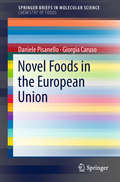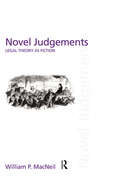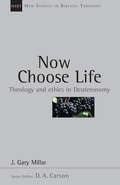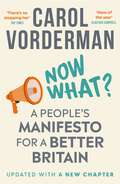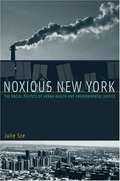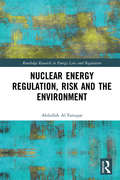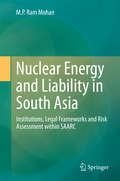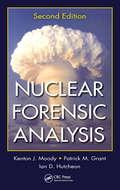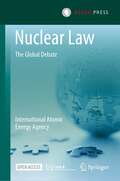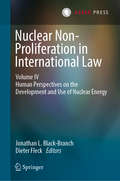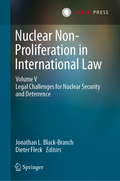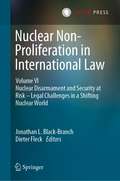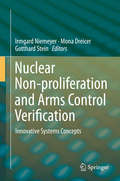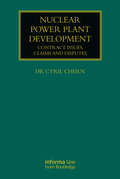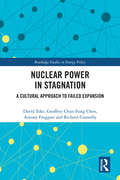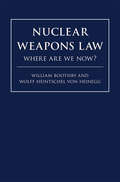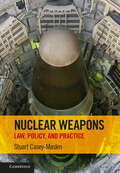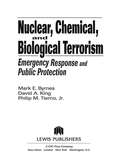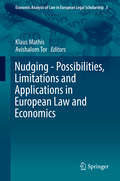- Table View
- List View
Novel Foods in the European Union (SpringerBriefs in Molecular Science)
by Giorgia Caruso Daniele PisanelloThis Brief describes in three concise chapters one of the newest ‘hot topics’ under EU Food Law and Policy: the new Regulation (EU) No 2015/2283 from the European Parliament and by the Council, November 25, 2015, on novel foods, applicable from January 2018. In this work, the Authors discuss the long-time criticized EU Regulation on novel foods ((EC) No 258/1997) and how it has been significantly altered by the adoption of the new regulation. In the first chapter, the Authors provide a comprehensive analysis of the genesis of the new Regulation, its rationale and the policy’s goals. In particular, they describe what food business operators shall do in order to get a new product allowed on the EU market, providing updated information on the regulatory developments from the European Food Safety Authority in nanofoods, cloned animals and insect foods. The role of the European Food Safety Authority is also discussed. The second Chapter summarizes the current toxicological studies used to evaluate novel foods safety, which are an extremely important pillar when speaking of food safety and commercial introduction of new products. Finally, the third Chapter discusses the ‘history of safe use’ approach to the problem of novel foods, and factors such as consumption period analysis, preparation advices and processes, intake levels, nutritional composition, and results of animal studies. Food lawyers, professionals and auditors working in the area of official inspections, quality assurance, food traceability, and international regulation, both in academia and industry, will find this Brief an important account.
Novel Judgements: Legal Theory as Fiction
by William P. MacNeilNovel Judgements is a book about nineteenth century Anglo-American law and literature. But by redefining law as legal theory, Novel judgements departs from ‘socio-legal’ studies of law and literature, often dated in their focus on past lawyering and court processes. This texts ‘theoretical turn’ renders the period’s ‘law-and-literature’ relevant to today’s readers because the nineteenth century novel, when "read jurisprudentially", abounds in representations of law’s controlling concepts, many of which are still with us today. Rights, justice, law’s morality; each are encoded novelistically in stock devices such as the country house, friendship, love, courtship and marriage. In so rendering the public (law) as private (domesticity), these novels expose for legal and literary scholars alike the ways in which law comes to mediate all relationships—individual and collective, personal and political—during the nineteenth century, a period as much under the Rule of Law as the reign of Capital. So these novels pass judgement—a novel judgement—on the extent to which the nineteenth century’s idea of law is collusive with that era’s Capital, thereby opening up the possibility of a new legal theoretical position: that of a critique of the law and a law of critique.
Now Choose Life: Theology and Ethics in Deuteronomy (New Studies in Biblical Theology #Volume 6)
by Gary MillarThough written thousands of years ago, the book of Deuteronomy is unmatched in its relevance for the affluent Western church of today. Moses' words were meant to equip God's people for living godly lives in a prosperous, pluralistic world. The cultural changes now taking place in our own social setting make the parallel between Israel and the church—and what Deuteronomy has to say—both pertinent and instructive. This New Studies in Biblical Theology volume offers a significant study of Deuteronomy that recovers this Scripture's vibrant message for the contemporary Christian community. Showing the major contribution that Deuteronomy makes to our understanding of the Bible as a whole, J. Gary Millar explores Deuteronomy's ethical teaching in the light of its most important theological themes: covenant, journey, law, the nations and human nature. His perceptive analysis reveals the power with which Deuteronomy calls God's covenant people, from ancient Israelites to modern-day Christians, to hear God's voice and do his will. Whether read for its critical study of Scripture or for its practical insights into living faithfully today, this book will be a valuable resource for school, church and home. Addressing key issues in biblical theology, the works comprising New Studies in Biblical Theology are creative attempts to help Christians better understand their Bibles. The NSBT series is edited by D. A. Carson, aiming to simultaneously instruct and to edify, to interact with current scholarship and to point the way ahead.
Now For Then: How To Face The Digital Future Without Fear
by Ben HammersleyIn 64 THINGS YOU NEED TO KNOW NOW FOR THEN, Editor-at-Large for Wired magazine and guru of the digital age Ben Hammersley gives us the essential guide to the things we need to know for life in the 21st century. Explaining the effects of the changes in the modern world, and the latest ideas in technology, culture, business and politics, this book will demystify the internet, decode cyberspace, and guide you through the innovations of the revolution we are all living through. This is not a book for geeks. 64 THINGS YOU NEED TO KNOW NOW FOR THEN is for everyone who wants to truly understand the modern world, to no longer be confused by the changes in society, business and culture, and to truly prosper in the coming decade.
Now For Then: How to Face the Digital Future Without Fear
by Ben HammersleyIn 64 THINGS YOU NEED TO KNOW NOW FOR THEN, Editor-at-Large for Wired magazine and guru of the digital age Ben Hammersley gives us the essential guide to the things we need to know for life in the 21st century. Explaining the effects of the changes in the modern world, and the latest ideas in technology, culture, business and politics, this book will demystify the internet, decode cyberspace, and guide you through the innovations of the revolution we are all living through. This is not a book for geeks. 64 THINGS YOU NEED TO KNOW NOW FOR THEN is for everyone who wants to truly understand the modern world, to no longer be confused by the changes in society, business and culture, and to truly prosper in the coming decade.
Now What?: On a Mission to Fix Broken Britain
by Carol VordermanPolitics: The three vowels and five consonants which control our world.'But what has politics got to do with me?' I hear you ask. Well, quite a lot really. Whether you like it or not, it affects every single thing in your life from the moment you wake up in the morning until you crawl into bed at night.But some of our political elite make it feel like a club which we have not been invited to join. The privileged few who want to keep it all for the privileged few. I hope this book can explain much, make you laugh out loud and make you realise that together our voices are powerful.Buckle up and come on a political rollercoaster with me - 'an old bird with an iPhone'. This is a book for people who don't normally think about politics. We have a new government and have bid a loud goodbye to the Tories, but the issues that allowed the last government to mismanage and deceive us for so long lie deep. Amidst a landscape of economic turmoil and deepening societal fractures, we need to see a new age of accountability in our political system.With her characteristic outspokenness and irrepressible sense of humour, in Now What? On a Mission to Fix Broken Britain, Carol Vorderman exposes the intricate web of influence responsible for our nation's unravelling and provides us with a toolkit for building a better and fairer Britain.Part diary, part manifesto, part journey down the rabbit hole of British politics, this is the story of how 'an old bird with an iPhone' exposed the incompetence and lies of the establishment, and inspired countless others to find their voice and stand up for what they believe in.
Now What?: On a Mission to Fix Broken Britain
by Carol VordermanPolitics: The three vowels and five consonants which control our world.'But what has politics got to do with me?' I hear you ask. Well, quite a lot really. Whether you like it or not, it affects every single thing in your life from the moment you wake up in the morning until you crawl into bed at night.But some of our political elite make it feel like a club which we have not been invited to join. The privileged few who want to keep it all for the privileged few. I hope this book can explain much, make you laugh out loud and make you realise that together our voices are powerful.Buckle up and come on a political rollercoaster with me - 'an old bird with an iPhone'. This is a book for people who don't normally think about politics. We have a new government and have bid a loud goodbye to the Tories, but the issues that allowed the last government to mismanage and deceive us for so long lie deep. Amidst a landscape of economic turmoil and deepening societal fractures, we need to see a new age of accountability in our political system.With her characteristic outspokenness and irrepressible sense of humour, in Now What? On a Mission to Fix Broken Britain, Carol Vorderman exposes the intricate web of influence responsible for our nation's unravelling and provides us with a toolkit for building a better and fairer Britain.Part diary, part manifesto, part journey down the rabbit hole of British politics, this is the story of how 'an old bird with an iPhone' exposed the incompetence and lies of the establishment, and inspired countless others to find their voice and stand up for what they believe in.
Now What?: On a Mission to Fix Broken Britain
by Carol VordermanPolitics: The three vowels and five consonants which control our world.'But what has politics got to do with me?' I hear you ask. Well, quite a lot really. Whether you like it or not, it affects every single thing in your life from the moment you wake up in the morning until you crawl into bed at night.But some of our political elite make it feel like a club which we have not been invited to join. The privileged few who want to keep it all for the privileged few. I hope this book can explain much, make you laugh out loud and make you realise that together our voices are powerful.Buckle up and come on a political rollercoaster with me - 'an old bird with an iPhone'. This is a book for people who don't normally think about politics. We have a new government and have bid a loud goodbye to the Tories, but the issues that allowed the last government to mismanage and deceive us for so long lie deep. Amidst a landscape of economic turmoil and deepening societal fractures, we need to see a new age of accountability in our political system.With her characteristic outspokenness and irrepressible sense of humour, in Now What? On a Mission to Fix Broken Britain, Carol Vorderman exposes the intricate web of influence responsible for our nation's unravelling and provides us with a toolkit for building a better and fairer Britain.Part diary, part manifesto, part journey down the rabbit hole of British politics, this is the story of how 'an old bird with an iPhone' exposed the incompetence and lies of the establishment, and inspired countless others to find their voice and stand up for what they believe in.
Nowhere to Live: The Hidden Story of America's Housing Crisis
by James S. BurlingA century of policy mistakes ruined America&’s cities and created an unprecedented housing crisis. For many families, homelessness is no longer someone else&’s problem. It is right around the corner, a real threat in their own immediate future. Our housing crisis is the result of a long history of government policies, court cases, and political manipulation. While these disparate causes make up a tangled web, they have one surprising root: the attack on private property rights. For more than a century, government policies and court decisions have attacked, undermined, and eroded private property rights. Whether it be exclusionary zoning, eminent domain abuse, rent control, or excessive environmental regulations, the cumulative impact of these assaults on private property is that it&’s become increasingly difficult—or even impossible—to build adequate housing supplies to meet market demands. We are fast approaching a time when millions of typical Americans will, quite literally, have nowhere to live. Nowhere to Live: The Hidden Story of America&’s Housing Crisis, takes readers through the history of how we got here. With stories going back to the Civil War, the early twentieth century, and the ill-fated &“urban renewal&” movement of the 1950s, Nowhere to Live reveals how the government layered mistake upon mistake to create the current crisis. It also provides a way out: not by government fiat, but through the restoration of private property rights.
Noxious New York: The Racial Politics of Urban Health and Environmental Justice
by Julie SzeDrawing extensively on fieldwork and interviews with community members and activists, Sze illuminates the complex mix of local and global issues that fuels environmental justice activism.
Nuclear Energy Regulation, Risk and The Environment (Routledge Research in Energy Law and Regulation)
by Abdullah Al FaruqueAnalyzing the impact and benefits of nuclear energy on environment, this book examines nuclear treaties in relation to environmental protection, highlights legal framework on non-proliferation and denuclearization, explores treaties on nuclear safety and nuclear security, discusses legal regimes on management of nuclear wastes, assesses the third-party liability regime and discusses the role of IAEA, EURATOM and NEA in regulating nuclear energy. It explores nuclear energy in the context of climate change and sustainable development. This book also examines the international legal framework on notification, assistance and emergency preparedness in the event of nuclear accidents, considers legal aspects of decommissioning of nuclear power plants and main legislative trends on nuclear energy use in selected countries. It also addresses regulatory responses to nuclear energy in the wake of the Fukushima power plant nuclear accident in Japan.
Nuclear Energy and Liability in South Asia
by M. P. Ram MohanThis book advocates pursuing a regional approach to nuclear risk framework, which it argues is more promising in the current scenario than the non-achievable global regime. In the development of international legislation on liability, the nuclear energy sector represents an alternative approach to a transboundary liability regime. Building on this foundation and following the Chernobyl accident, international consensus was sought for a stronger transboundary legal regime in the event of a nuclear disaster. However, after sixty years of the existence of international nuclear liability laws and twenty-five years after Chernobyl, the primary objectives of the Conventions - harmonization and a global regime - remain unfulfilled. Further, many countries are now creating or expanding nuclear programs without adequate transboundary legal protection. In light of these issues, a regional approach is an option that cannot be ignored. Given its rapidly expanding nuclear energy footprint, South Asia is in a unique position to adopt a regional mechanism. The methodology adopted for the study in the book combines a literature review of international law on nuclear liability with an analysis of South Asian nuclear energy programs and their international and national legal obligations. A technical risk assessment study conducted to identify the level of transboundary nuclear risk within South Asia is also presented. This is followed by interviews with experts and policymakers to gauge the willingness of the South Asian Association for Regional Cooperation (SAARC) community to respond to this shared regional concern.
Nuclear Forensic Analysis
by Kenton J. Moody Patrick M. Grant Ian D. HutcheonNow in its second edition, Nuclear Forensic Analysis provides a multidisciplinary reference for forensic scientists, analytical and nuclear chemists, and nuclear physicists in one convenient source. The authors focus particularly on the chemical, physical, and nuclear aspects associated with the production or interrogation of a radioactive sample.
Nuclear Law: The Global Debate
by International Atomic Energy AgencyThis open access book traces the journey of nuclear law: its origins, how it has developed, where it is now, and where it is headed. As a discipline, this highly specialized body of law makes it possible for us to benefit from the life-saving applications of nuclear science and technology, including diagnosing cancer as well as avoiding and mitigating the effects of climate change. This book seeks to give readers a glimpse into the future of nuclear law, science and technology. It intends to provoke thought and discussion about how we can maximize the benefits and minimize the risks inherent in nuclear science and technology. This compilation of essays presents a global view in discipline as well as in geography. The book is aimed at representatives of governments—including regulators, policymakers and lawmakers—as well representatives of international organizations and the legal and insurance sectors. It will be of interest to all those keen to better understand the role of law in enabling the safe, secure, and peaceful use of nuclear technology around the world. The contributions in this book are written by leading experts, including the IAEA’s Director General, and discuss the four branches of nuclear law—safety, security, safeguards and nuclear liability—and the interaction of nuclear law with other fields of national and international law.
Nuclear Non-Proliferation in International Law - Volume IV: Human Perspectives On The Development And Use Of Nuclear Energy
by Jonathan L. Black-Branch Dieter FleckThis fourth volume in the book series on Nuclear Non-Proliferation in InternationalLaw focuses on human perspectives regarding the development and use of nuclearenergy; the need for regional solutions; and recent activities towards prohibiting andabolishing nuclear weapons.Jonathan L. Black-Branch is Dean of Law and Professor of International and ComparativeLaw; Bencher of the Law Society of Manitoba; JP and Barrister (England & Wales);Barrister & Solicitor (Manitoba); and, Chair of the International Law Association (ILA)Committee on Nuclear Weapons, Non- Proliferation & Contemporary International Law.Dieter Fleck is Former Director International Agreements & Policy, Federal Ministryof Defence, Germany; Member of the Advisory Board of the Amsterdam Center forInternational Law (ACIL); and Rapporteur of the International Law Association (ILA)Committee on Nuclear Weapons, Non- Proliferation & Contemporary International Law.
Nuclear Non-Proliferation in International Law - Volume V: Legal Challenges for Nuclear Security and Deterrence
by Jonathan L. Black-Branch Dieter FleckThis fifth volume in the book series on Nuclear Non-Proliferation in International Law focuses on various legal aspects regarding nuclear security and nuclear deterrence. The series on Nuclear Non-Proliferation in International Law provides scholarly research articles with critical commentaries on relevant treaty law, best practice and legal developments, thus offering an academic analysis and information on practical legal and diplomatic developments both globally and regionally. It sets a basis for further constructive discourse at both national and international levels. Jonathan L. Black-Branch is Dean of Law and Professor of International and Comparative Law at the University of Manitoba in Canada; a Bencher of the Law Society of Manitoba; JP and Barrister (England & Wales); Barrister & Solicitor (Manitoba); and Chair of the International Law Association (ILA) Committee on Nuclear Weapons, Non-Proliferation & Contemporary International Law. Dieter Fleck is Former Director International Agreements & Policy, Federal Ministry of Defence, Germany; Member of the Advisory Board of the Amsterdam Center for International Law (ACIL); and Rapporteur of the International Law Association (ILA) Committee on Nuclear Weapons, Non-Proliferation & Contemporary International Law.
Nuclear Non-Proliferation in International Law - Volume VI: Nuclear Disarmament and Security at Risk – Legal Challenges in a Shifting Nuclear World
by Jonathan L. Black-Branch Dieter FleckThis sixth volume of the book series on Nuclear Non-Proliferation in International Law focuses on current legal challenges regarding nuclear disarmament and security. The Series on Nuclear Non-Proliferation in International Law provides scholarly research articles with critical commentaries on relevant treaty law, best practice and legal developments, thus offering an academic analysis and information on practical legal and diplomatic developments both globally and regionally. It sets a basis for further constructive discourse at both national and international levels. Jonathan L. Black-Branch is Chair of the ILA Committee on Nuclear Weapons, Non-Proliferation and Contemporary International Law and President and CEO of ISLAND - The Foundation for International Society of Law and Nuclear Disarmament. Dieter Fleck is Former Director International Agreements & Policy, Federal Ministry of Defence, Germany; Member of the Advisory Board of the Amsterdam Center for International Law (ACIL); Rapporteur of the International Law Association (ILA) Committee on Nuclear Weapons, Non-Proliferation & Contemporary International Law.
Nuclear Non-proliferation and Arms Control Verification: Innovative Systems Concepts
by Irmgard Niemeyer Mona Dreicer Gotthard SteinThis book strives to take stock of current achievements and existing challenges in nuclear verification, identify the available information and gaps that can act as drivers for exploring new approaches to verification strategies and technologies. With the practical application of the systems concept to nuclear disarmament scenarios and other, non-nuclear verification fields, it investigates, where greater transparency and confidence could be achieved in pursuit of new national or international nonproliferation and arms reduction efforts. A final discussion looks at how, in the absence of formal government-to-government negotiations, experts can take practical steps to advance the technical development of these concepts.
Nuclear Power Plant Development: Contract Issues, Claims and Disputes (Construction Practice Series)
by Cyril ChernNuclear Power Plant Development covers the intricacies of developing a nuclear power plant project from a construction and legal standpoint. It deals with structuring, drafting, and negotiating a wide range of standard and specialised contracts relating to the development of nuclear power-generation projects and also covers the other forms of power-generating facilities. It covers the forms of contract, the law involved internationally, and potential areas of pitfalls and how to avoid them in a systematic format covering various forms of projects. It is suitable for solicitors and barristers involved in the contracting for such facilities and the handling of litigation related to them, government officials involved in the commissioning and development of nuclear facilities for regional governments, and engineers and contractors involved in the actual work of design and contract administration and dispute resolution.
Nuclear Power in Stagnation: A Cultural Approach to Failed Expansion (Routledge Studies in Energy Policy)
by David Toke Richard Connolly Geoffrey Chun-Fung Chen Antony FroggattThis book studies the extent to which nuclear safety issues have contributed towards the stagnation of nuclear power development around the world, and accounts for differences in safety regulations in different countries. In order to understand why nuclear development has not met widespread expectations, this book focusses on six key countries with active nuclear power programmes: the USA, China, France, South Korea, the UK, and Russia. The authors integrate cultural theory and theory of regulation, and examine the links between pressures of cultural bias on regulatory outcomes and political pressures which have led to increased safety requirements and subsequent economic costs. They discover that although nuclear safety is an important upward driver of costs in the nuclear power industry, this is influenced by the inherent need to control potentially dangerous reactions rather than stricter nuclear safety standards. The findings reveal that differences in the strictness of nuclear safety regulations between different countries can be understood by understanding differences in cultural contexts and the changes in this over time. This book will be of great interest to students, scholars, and policymakers working on energy policy and regulation, environmental politics and policy, and environment and sustainability more generally.
Nuclear Weapons Law: Where Are We Now?
by William H. Boothby Wolff Heintschel von HeineggThis book examines the law relating to the possession, threat or use of nuclear weapons. By addressing in logical sequence the law regarding sovereignty, the threat or use of force, the conduct of nuclear hostilities, neutrality, weapons law and war crimes, the book illustrates the topics that an effective national command, control and communications system for nuclear weapons must address. Guidance is given on intractable issues, such as the responsibilities of remote submarine commanders. The continuing relevance of the ICJ's Nuclear Advisory Opinion is assessed, and the prospects for the Treaty on the Prohibition of Nuclear Weapons are discussed. The book has been written in an accessible style so that it will be equally useful to lawyers and practitioners, including relevant commanders, politicians, policy staffs and academics. The objective is to state the law accurately and to explain its implications and provide practical guidance in this most sensitive area.
Nuclear Weapons Under International Law
by Gro Nystuen Stuart Casey-Maslen Gro Nystuen Stuart Casey-Maslen Annie Golden BersagelNuclear Weapons under International Law is a comprehensive treatment of nuclear weapons under key international law regimes. It critically reviews international law governing nuclear weapons with regard to the inter-state use of force, international humanitarian law, human rights law, disarmament law, and environmental law, and discusses where relevant the International Court of Justice's 1996 Advisory Opinion. Unique in its approach, it draws upon contributions from expert legal scholars and international law practitioners who have worked with conventional and non-conventional arms control and disarmament issues. As a result, this book embraces academic consideration of legal questions within the context of broader political debates about the status of nuclear weapons under international law.
Nuclear Weapons: Law, Policy, and Practice
by Stuart Casey-MaslenA new nuclear arms race is underway between Russia and the United States, one that focuses on the technology of delivery of nuclear warheads. This book describes how and why this race is happening, who still possesses nuclear weapons, and what constraints apply to those weapons under international law. A global nuclear ban treaty entered into force in January 2021, but the nuclear powers kept distant. The last remaining treaty restraining the arsenals of the two nuclear superpowers will expire in less than five years' time and the risk is that other States will turn to nuclear arms for their defence, further fracturing the non-proliferation regime installed after the Cuban missile crisis.
Nuclear, Chemical, and Biological Terrorism: Emergency Response and Public Protection
by Mark E. Byrnes David A. King Philip M. Tierno Jr.This book provides guidance on measures that should be considered to protect human lives from terrorist activities involving nuclear, chemical, and biological weapons. It provides a historical summary of the development and use of these weapons, and continues with a detailed discussion of the types of radiation and warfare agents that are available
Nudging - Possibilities, Limitations and Applications in European Law and Economics
by Klaus Mathis Avishalom TorThis anthology provides an in-depth analysis and discusses the issues surrounding nudging and its use in legislation, regulation, and policy making more generally. The 17 essays in this anthology provide startling insights into the multifaceted debate surrounding the use of nudges in European Law and Economics. Nudging is a tool aimed at altering people's behaviour in a predictable way without forbidding any option or significantly changing economic incentives. It can be used to help people make better decisions to influence human behaviour without forcing them because they can opt out. Its use has sparked lively debates in academia as well as in the public sphere. This book explores who decides which behaviour is desired. It looks at whether or not the state has sufficient information for debiasing, and if there are clear-cut boundaries between paternalism, manipulation and indoctrination. The first part of this anthology discusses the foundations of nudging theory and the problems associated, as well as outlining possible solutions to the problems raised. The second part is devoted to the wide scope of applications of nudges from contract law, tax law and health claim regulations, among others. This volume is a result of the flourishing annual Law and Economics Conference held at the law faculty of the University of Lucerne. The conferences have been instrumental in establishing a strong and ever-growing Law and Economics movement in Europe, providing unique insights in the challenges faced by Law and Economics when applied in European legal traditions.
